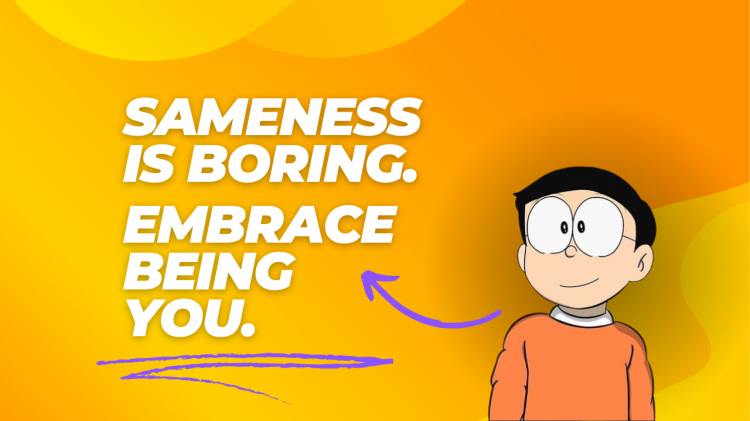When it comes to childhood memories, few shows have left as deep an imprint as Doraemon. The adorable robotic cat from the 22nd century and his lazy but kind-hearted friend Nobita have entertained and educated generations. Amidst their quirky gadgets and misadventures, Doraemon episodes often carried subtle yet profound life lessons, and one such gem is "The Nobita Mirror" (or its equivalent in localized versions).
At first glance, this episode appears to be another lighthearted adventure featuring one of Doraemon's futuristic gadgets. But as the plot unfolds, it leaves viewers with a thought-provoking and timeless message about individuality, empathy, and the importance of diversity.
The Plot: Frustration and a Wish
The story begins with a typical day for Nobita, one where nothing seems to go his way. His mother scolds him for not completing his homework, Shizuka prioritizes studying over playing with him, and Gian and Suneo pick on him for being weak and unskilled. Feeling defeated and misunderstood, Nobita vents his frustrations to Doraemon, lamenting, “Why can’t everyone be like me? Life would be so much better if they thought and acted like me!”
This is the tipping point. Doraemon, as always, decides to grant Nobita’s wish with the help of one of his gadgets. He introduces a mirror-like device that can reflect Nobita’s personality onto anyone who looks into it. Once reflected, people around Nobita start thinking, behaving, and making decisions just like him.
At first, Nobita is delighted. Everyone is suddenly just as laid-back and carefree as he is. No more criticism, no more scolding, and no one to make him feel inferior. For the first time, Nobita feels like he belongs.
When Sameness Turns to Chaos
But as the day progresses, Nobita’s dream world turns into a nightmare. His once-organized mother stops caring about household chores and decides to nap, just like Nobita. Shizuka, who is usually diligent, begins procrastinating and skips her studies. Gian, instead of being his usual overbearing self, starts shirking his responsibilities, leaving his friends without leadership during a game. Even the adults in Nobita’s neighborhood mirror his carefree and unmotivated nature, leading to disruptions in daily life.
Before long, chaos ensues. Nobody takes charge of tasks, no one steps up to resolve conflicts, and productivity in every corner of Nobita’s world grinds to a halt. Nobita realizes the harsh truth, his world cannot function if everyone is like him.
The Lesson: Embracing Diversity
This episode beautifully illustrates why diversity is essential, not only in society but in every aspect of life. Nobita’s frustration stemmed from a common human tendency: the desire for others to think, act, and behave the way we do. It’s a longing for validation and understanding, especially when we feel out of place. However, as Nobita discovered, a world where everyone is the same lacks balance, progress, and purpose.
Here are the key lessons we can draw from this story:
1. Strength Lies in Differences
Imagine a world where everyone had the same talents, thoughts, and weaknesses. It would be a stagnant world, devoid of innovation, creativity, and growth. In the episode, Nobita realizes that the qualities he often dislikes in others, Shizuka’s focus, Gian’s leadership (even if it’s overbearing), and his mother’s discipline, are what keep the world around him moving.
Diversity allows people to complement each other’s strengths and weaknesses. It’s precisely because people have unique traits that teams thrive, societies progress, and relationships flourish.
2. Empathy Comes from Understanding Others
Nobita’s initial wish for everyone to be like him was rooted in his frustration at being misunderstood. However, when he saw the chaos that his personality caused in others, he gained a new appreciation for their individuality.
This is a reminder to all of us: when we feel frustrated by someone’s actions or decisions, we should take a step back and try to understand their perspective. Empathy is born out of recognizing that everyone’s differences add value, even if we don’t immediately see it.
3. Self-Improvement is Key
While Nobita initially wished for others to change, the episode subtly nudges us toward a different perspective: the importance of self-improvement. Instead of wishing for the world to conform to us, perhaps the better path is to identify areas where we can grow. Nobita’s laziness and lack of responsibility were amplified when others mirrored him, showing him the need to address these traits within himself.
In real life, it’s easy to blame others or external circumstances for our frustrations. However, lasting change often starts from within.
4. Balance is Essential
Every trait, whether positive or negative, serves a purpose in the bigger picture. Gian’s assertiveness, though sometimes unpleasant, makes him a natural leader. Shizuka’s dedication to her studies inspires Nobita to do better. Even Suneo’s show-off nature teaches Nobita the importance of humility.
In the same way, a harmonious world requires a balance of personalities, skills, and perspectives. The key is to recognize the value each person brings and to find ways to work together.
The Role of Doraemon’s Gadgets: A Metaphor for Human Desires
Doraemon’s gadgets often serve as metaphors for human tendencies. In this case, the mirror gadget represented Nobita’s desire for validation and a simplified life. However, like most of Doraemon’s tools, the gadget also acted as a mirror to reality, forcing Nobita to confront the consequences of his wish.
How often do we, like Nobita, wish for quick fixes? Perhaps we wish our colleagues were more like us, our friends made the same choices we would, or our family members shared our perspectives. This episode reminds us that such wishes, while comforting in theory, would rob life of its richness and complexity.
Relating It to Our Lives
The lesson from "The Nobita Mirror" extends beyond childhood storytelling and speaks to challenges we face as adults. Whether it’s in workplaces, relationships, or communities, there’s a temptation to surround ourselves with like-minded individuals. While finding common ground is important, true progress comes from embracing differences and learning from them.
For example:
- In the workplace, teams thrive when they consist of diverse skill sets. A group of creative thinkers needs organized planners to turn ideas into action. Similarly, leaders and followers complement each other to achieve goals.
- In personal relationships, conflicts often arise from differences in personality or perspective. However, these differences can also foster growth, as they challenge us to expand our worldview and develop patience, understanding, and adaptability.
- In society, embracing diversity in culture, thought, and experience leads to innovation and resilience. It’s through collaboration across differences that humanity solves its greatest challenges.
Conclusion: Celebrating Uniqueness
"The Nobita Mirror" is more than just a whimsical episode of Doraemon. It’s a reminder of the beauty and necessity of diversity in our lives. Nobita’s journey, from frustration to appreciation, mirrors the journey we all must take in understanding and valuing those around us.
Instead of wishing for others to be like us, let’s celebrate the differences that make life dynamic and meaningful. After all, it’s the blend of strengths, perspectives, and personalities that creates a world worth living in.
And as Nobita learns by the end of the episode, the key to happiness isn’t changing others to suit us, it’s recognizing that everyone, just like Doraemon’s gadgets, has a unique purpose in our lives.







